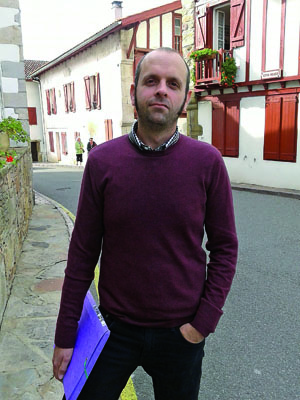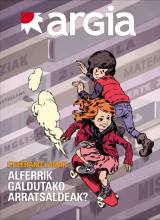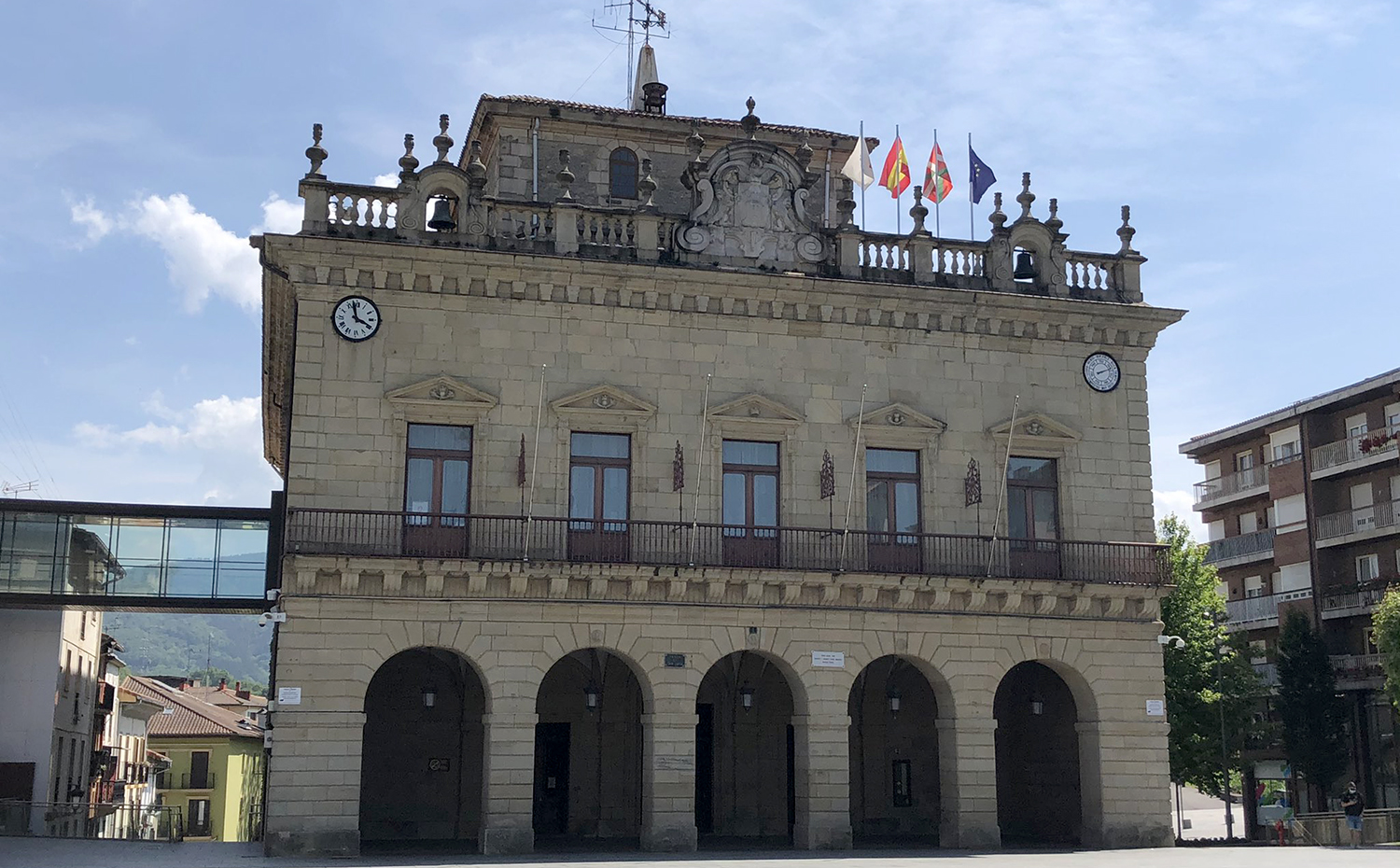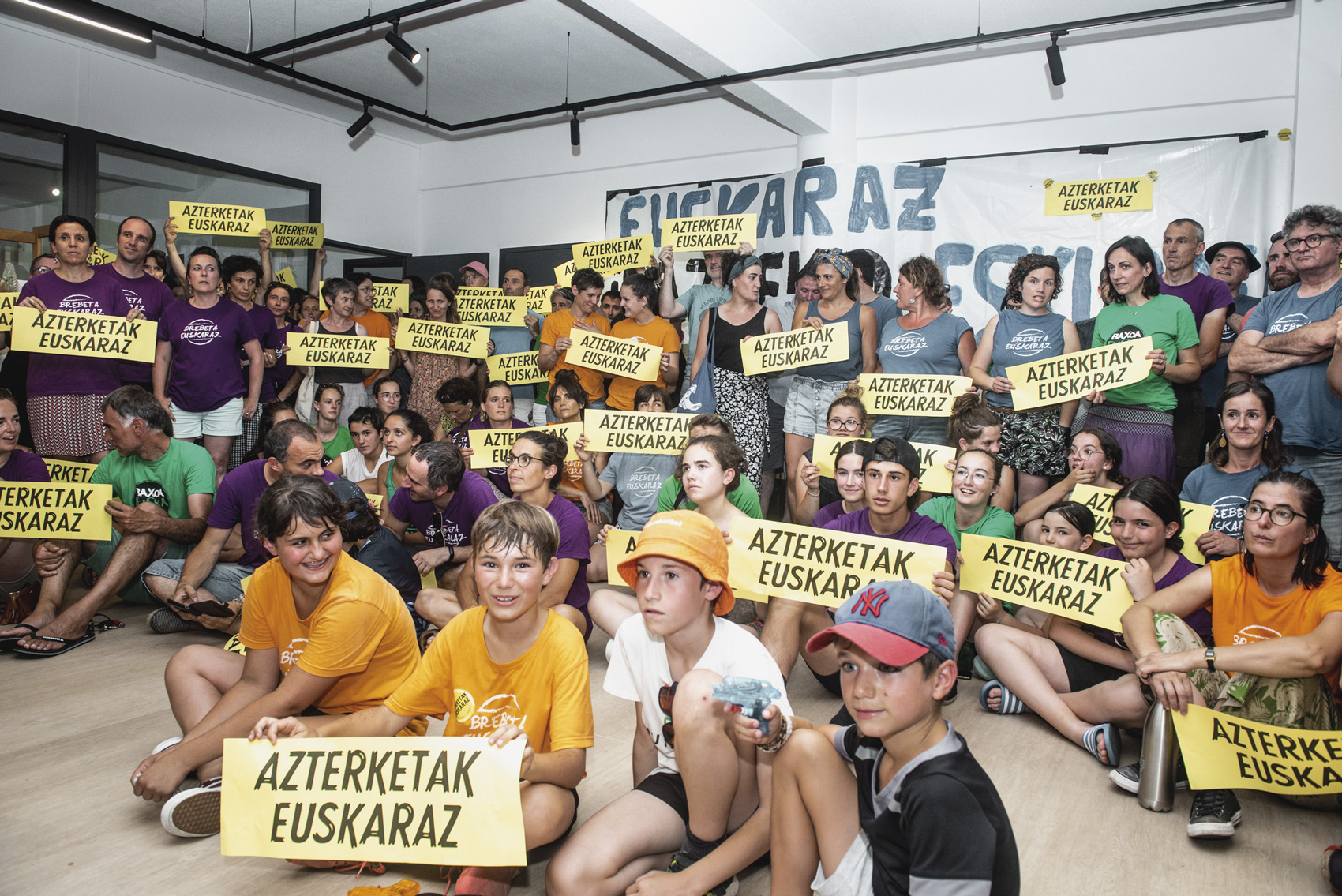"The negotiations of the Basque section have failed"
- San Juan de Luz, 1976. Spokesman for the Basque Confederation. He is a professor of AEK, responsible for the Night Schools of Azkaine and Senpere. In his opinion, at the demonstration on 24 October in Baiona, the slogans “The Basque language official!” and “Euskal Herri Elkargoa!” were heard.

7. Deiadar’s act brought thousands of people together in the streets of the working capital. The spokesman for the Basque Confederation, Sébastien Castet, told us the day after the demonstration: “For the first time in the history of Deiadar’s manifestations, the problem of territoriality has been added to that of language. The following months will be decisive. Because all the councils of each people will have to vote for or against the single community of Ipar Euskal Herria. The 5,000 people gathered on 24 October gave a clear "yes".
The demonstration was jointly convened by the Basque Football Confederation (ANV) and Batera. What does this mean?
Various actors participated in the creation of the Batasuna. The Basque Confederation has been a member since its inception. In recent years the most mentioned issue is the institutionalization of the Basque Country, and therefore we must remember that Batera has four demands: its own university, the Chamber of Agriculture, the Basque Institution and the Basque Government. The Basque Confederation is the carrier of this latter requirement. The four sectors complement each other and support each other. Soon, through the caravan Batera a socialization work will be carried out in favor of the Commonwealth, with a clear objective: that the councils of the locality vote in favour of the Commonwealth next spring, with all the benefits that the creation of the College entails for the Basque Country.
How is the Basque Confederation?
Strong. This year marks the 20th anniversary of the founding of the company. We federate all the associations that work or are in favour of Euskera: AEK, SEASKA, Euskal Haziak, Eskola elebunak, Berria egunkaria, Euskal Irratiak, Bertsularien lagunak.. For the sake of all associations, we are an incentive for the work of the public authorities, especially in the framework of the laws.
Is citizenship interested in Euskera? Is Euskera healthy?
The situation is not idyllic, but steps have been taken over 20 years. The year 2005 was a milestone, since it was then that the Public Institute of the Basque Language (EEP), the body responsible for developing language policy, was established. The Linguistic Council came with the EEP. If we create them, it is thanks to the work done in Basque.
You're also a AEK worker. Is Euskera's learning request maintained?
Yes. At AEK 1,000 students work in the Night Schools and at the same time we offer training for both the staff of the town houses and the staff of the administration. Each year we train about 200 workers in Euskera, so we respond to the demand. On the other hand, in teaching, SEASKA is increasing the demand of parents who opt for the model of immersion in ikastolas; both in private and public schools, bilingualism has also increased. Demand exists, but to do so, structures must be strengthened: AEK has 30 workers, Euskal Irratiak has as many others. These are just two examples. New initiatives are currently being developed and deepened. But it is true that we are developing more and more projects and the conditions for dealing with them are not the best. In other words, we have reached a legal and financial deadlock.
In fact, it seems that the language policy launched by the EEP has provided everything it could bring.
We believe that the EEP has hit the ceiling. As soon as the EEP was created, it convened the members of the Basque Confederation by areas for the linguistic project they wanted to develop. Progress has been made since its inception to the present day, since there was nothing structured to bring public language, that is, when everything was created it was about to be done. When we leave the gap it is easy to advance, however, from a moment on, if the law is not in our favor and the economic resources are scarce, we reach the border. That has happened to us.
We think we need to move on to another phase. For example, in order to meet the needs of everyday life, it is essential to be a Basque political institution. That is, on the one hand, that institution would decide how much money it spends on language policy and, on the other, would negotiate funding with the State and the Region in particular. The Basque Country needs new allies and nudges. We need a strong political institution for the North, a more daring linguistic policy to move forward.
In the meantime, few initiatives of the project managed by the Council of Elects will be financed. What happened?
Let us remember that the Development Council was consulted to make a contribution. He was about to sign the Territorial Contract and several ateliers were set up. One of them was the one related to Euskera. The Basque Confederation participated in it together with other actors. On the basis of the conclusions that emerged from Atelier, the Council of Elects proposed a pact for the Basque Country. The pact was negotiated in the Territorial Contract, with three parties. Section 1: Negotiation of priority directions with the Ministry of Education in the field of teaching. Paragraph 2: Professional training of the Basque Country. Section 3: Increase the PAL budget.
In this sense, our sector expressly required the participants in the Territorial Contract to move from 3 to 6 million euros: State, Region and Department. However, we have no news of the first two points in that pact. Nor do we know whether there are negotiations with the Ministry of Education. No training of professionals. The only thing we have known in the last month is that, according to the EEP, the money that had to come from these three institutions is not going to increase.
However, the Councils of Elects and Development have not rated everything negatively. They have pointed out that they can continue to negotiate with Euskalgintza’s partners through a clause agreed with them.
The observation we make is that the negotiations on the Basque country have failed. This constellation existed by the agents, but the political class also knows that a qualitative and quantitative leap had to be made in favor of the Basque people. Some voters also stressed that the Basque Country is a fundamental part of the Territorial Contract, which the Basque Country makes special the Territorial Contract. Therefore, if the Basque Country was not given the importance it needs in the negotiation, some said that the Territorial Contract had not to be signed. The negotiations have failed, but the Territorial Contract has been signed.
It is an agreement that maintains the hope that the contract will be revised in 2017.
Yes, we have heard it. The Contract will then be re-examined. This, that and others have said, but the Basque country cannot wait any longer. We're in lockdown. If no progress is made in the legal framework in Paris, unless funds are released in the meantime, so that the EEP can better conduct the language policy and help to develop the eleven projects that we have the players in the world of Euskera, which are essential.
The structure of Pays is overtaken and it is a transitional stage. Dangerous and decisive.
All the agents say so. I do not know if it is a moment of danger, nor if the Pays structure is overcome. I believe that we are at a crossroads, I am a decisive one. As such, the situation we are experiencing will change. And there is an opportunity to change, because in the past both the political class and society – in favour of the Territorial Community – have had a broad consensus to achieve our demands.
The French Government has rejected the proposal of the Territorial Community and has now proposed a new alternative through the prefect, which investigates.
And we still don't know how to call it the structure that's going to come out of there. But, ultimately, the College must be unique to the Basque Country. I say at the same time and as a member of the Confederation: we see the possibility of Euskal Herria being an institution. We regard this College as an intermediate stage for the achievement of the Territorial Community. If the Single European Community gives us coherent and well-coordinated steps, it must help us to have minimum harmonised development in all areas, we need that minimum institution to make way. Of course, in the Pays structure we see ourselves very limited. We cannot wait until 2017.
EEP chief Frantxoa Maitia said: “The Territorial Contract should not give more money to Basque education, but to public schools.
For us each institution has its own responsibility, in this case the Aquitaine Region. Frantxoa Maitia talks about the negotiation of the Territorial Contract and the Pact for the Basque Country. However, the pact is made up of the State, the Region and the Department, and not the communities of the peoples. He was very wrong to tell him. The Council of Elects has urged the three institutions to double the OPE budget. Do public schools, of course, want to give money? All right, all right. But peoples and public collectivities are not part of the Territorial Contract. Therefore, the conception of EEP is not correct, we should not confuse things. The State, the Region and the Department have agreed to the Language Policy, but now, apparently, they cannot get the funding they have to get and they cannot comply with what has been agreed. There is, therefore, an inconsistency here: they take what has been agreed for good, but at the same time they do not give the money.
Gabonetako argiak pizteko ekitaldia espainolez egin izanak, Irungo euskaldunak haserretzeaz harago, Aski Da! mugimendua abiatu zuen: herriko 40 elkarteren indarrak batuta, Irungo udal gobernuarekin bildu dira orain, alkatea eta Euskara zinegotzia tarteko, herriko eragileak... [+]
























